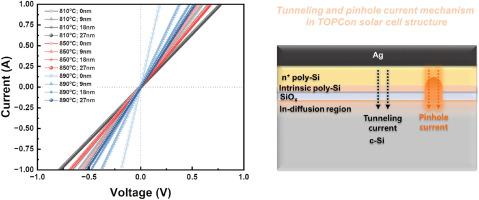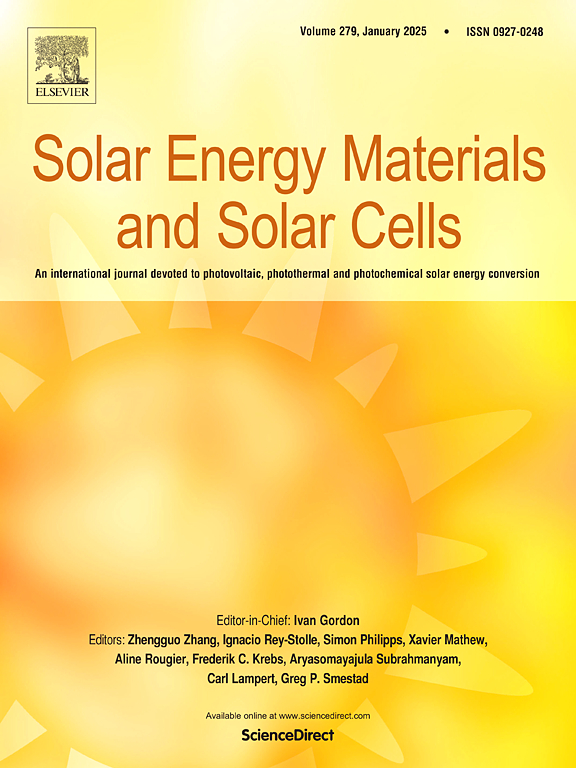本征多晶硅层厚度:多晶硅氧化物太阳能电池中针孔接触形成和界面钝化的作用
IF 6.3
2区 材料科学
Q2 ENERGY & FUELS
引用次数: 0
摘要
由于隧道氧化物和掺杂多晶硅层的化学钝化和场效应,隧道氧化物钝化接触(TOPCon)太阳能电池具有表面钝化和电传输效率高的特点。然而,钝化质量、隐含开路电压(iVoc)和器件寿命会受到高温加工的不利影响,导致隧道氧化层出现奥杰尔重组和针孔缺陷。本研究旨在探索引入本征多晶硅作为中间层以提高热稳定性,并评估其对隧道氧化物界面钝化的影响。研究结果表明,最小厚度为 18 纳米的本征多晶硅中间层可防止高温下的钝化降解。此外,这种中间膜的加入还有助于调整晶体硅中的掺杂曲线,从而降低针孔密度并增强 714.9 mV 的 iVoc。这些结果增进了我们对 TOPCon 太阳能电池性能的了解,并为进一步优化这些电池奠定了基础。本文章由计算机程序翻译,如有差异,请以英文原文为准。

Intrinsic Poly-Si layer thickness: Its role in pinhole contact formation and interface passivation in poly-silicon on oxide solar cells
Tunnel oxide passivating contact (TOPCon) solar cells are characterized by high surface passivation and electrical transport efficiency due to the chemical passivation and field effect of the tunnel oxide and doped poly-silicon layers, respectively. Nevertheless, the passivation quality, implied open-circuit voltage (iVoc), and device lifetime are adversely affected by high-temperature processing, leading to Auger recombination and pinhole defects in the tunnel oxide layer. This study aimed to explore the introduction of intrinsic poly-silicon as an interlayer to improve thermal stability and assesses its effect on the passivation of the tunnel oxide interface. Findings indicate that an intrinsic poly-silicon interlayer with a minimum thickness of 18 nm prevents passivation degradation at elevated temperatures. Additionally, the incorporation of this interlayer facilitates the tuning of the doping profile in crystalline silicon, resulting in a diminished pinhole density and an enhanced iVoc of 714.9 mV. These results advance our understanding of TOPCon solar cell performance and provide a foundation for their further optimization.
求助全文
通过发布文献求助,成功后即可免费获取论文全文。
去求助
来源期刊

Solar Energy Materials and Solar Cells
工程技术-材料科学:综合
CiteScore
12.60
自引率
11.60%
发文量
513
审稿时长
47 days
期刊介绍:
Solar Energy Materials & Solar Cells is intended as a vehicle for the dissemination of research results on materials science and technology related to photovoltaic, photothermal and photoelectrochemical solar energy conversion. Materials science is taken in the broadest possible sense and encompasses physics, chemistry, optics, materials fabrication and analysis for all types of materials.
 求助内容:
求助内容: 应助结果提醒方式:
应助结果提醒方式:


